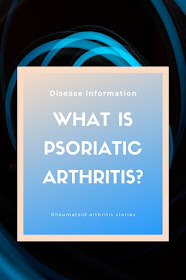Psoriatic arthritis, also called PsA, is an autoimmune condition that causes inflammation in the joints but can also affect other parts of the body. It can lead to permanent joint damage and other ongoing problems.
Psoriatic arthritis is a form of arthritis that affects a percentage of people who have psoriasis. Psoriasis is a skin disease that causes a red, scaly rash, on different areas including the hands and feet, elbows, knees and ankles.
The symptoms of painful and swollen joints in psoriatic arthritis are similar to those of rheumatoid arthritis. However, according to The Mayo Clinic, psoriatic arthritis is more likely to also cause:
- Swollen fingers and toes. Psoriatic arthritis can cause a painful, sausage-like swelling of your fingers and toes. You may also develop swelling and deformities in your hands and feet before having significant joint symptoms.
- Foot pain. Psoriatic arthritis can also cause pain at the points where tendons and ligaments attach to your bones — especially at the back of your heel (Achilles tendinitis) or in the sole of your foot (plantar fasciitis).
- Lower back pain. Some people develop a condition called spondylitis as a result of psoriatic arthritis. Spondylitis mainly causes inflammation of the joints between the vertebrae of your spine and in the joints between your spine and pelvis (sacroiliitis).
Diagnosis of Psoriatic arthritis
It isn’t easy to diagnose psoriatic arthritis because many symptoms are similar to other conditions. Your doctor will use the Classification of Psoriatic Arthritis (CASPAR) in which having at least 3 points is an indicator of psoriatic arthritis:
- Skin psoriasis
- You have it now = 2 points
- You had it = 1 point
- You have a family history = 1 point
- Nail lesions (pitting, pulling away from the nail bed) = 1 point
- Dactylitis (swollen, sausage-like fingers or toes ) = 1 point
- Negative rheumatoid factor : You don’t test positive for this blood protein that signals rheumatoid arthritis = 1 point
- Juxta-articular (near a joint) bone formation that shows up on X-ray and isn’t bone spurs = 1 point
Medical treatments for psoriatic arthritis include:
- Nonsteroidal anti-inflammatory drugs (NSAIDs).
- Disease-modifying antirheumatic drugs (DMARDs).
- Immunosuppressants.
- UV light.
- Biologics.
- Enzyme inhibitor.
- Steroids.
- Surgery.
- Regular use of lotions or creams containing aloe vera, jojoba or zinc may help lubricate affected skin.
- Taking short, warm (not hot) baths using oatmeal, bath oil, Dead Sea or Epsom salts may also soothe skin.
- Wash clothes with fragrance-free detergent and fabric softeners to reduce risk of skin reactions.
- Heat improves blood circulation helping to reduce joint stiffness and muscle spasms.
- relaxing and managing stress.
- Cold helps reduce swelling by constricting blood vessels. Eating anti-inflammatory foods: A healthy, balanced diet rich in fresh fruits and vegetables and low in sugar, fat and salt.

Chronitis? Lesions behind eye? Info please
ReplyDelete